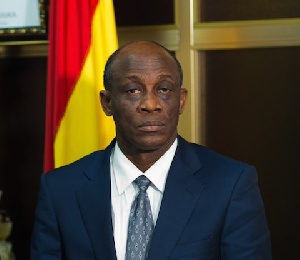 Seth Terkper, Minister of Finance
Seth Terkper, Minister of Finance
A Senior Economist at the University of Ghana, Dr. Ebo Turkson, has described government’s decision to issue a 3-year domestic bond as ill-timed -- citing a further crowding out of businesses as the likely result.
Government announced through the Finance Ministry last week that it will issue the GHc500million bond to reorganise its debts.
Dr. Turkson argues, however, that issuing the bond on the domestic market will make cost of credit expensive to the private sector, thereby crowding out many businesses from the credit market.
“Because Treasury bills are going to be offered at higher interest rates, credit available to investors in the economy will go to government, because banks will be inclined to lend to government rather than the private sector. Not only will those resources go to government, the resources that are left for the private sector to borrow will have to be borrowed at a high interest rate. And when that happens, we say the private sector is being crowded out of the credit market,” he said.
He further argued that it will worsen the private sector’s woes, as the sector has still not recovered from the challenges posed by high utility costs and high taxes.
“Looking at the way in which the private sector is grappling with energy issues, high utility prices and taxes etc., I would say government should not have issued the bond now so that at least the Treasury bill rates will come down a little. I think it is ill-timed,” he told the B&FT.
Dr. Turkson further urged government to use the Eurobond market as an alternative to domestic borrowing in order to avoid the persistent crowding out of the private sector, adding that government should borrow from the domestic market only if the money is to be invested in infrastructural projects which benefit the private sector.
“I will always side with government if it borrows to invest in infrastructure. But if money is borrowed to service our debts then it is a problem. At times the situation is that there is no way out, but I think government should be mindful of the impact it will have on the private sector so that unless it is borrowing to invest, it should not go to the domestic market to borrow because of the effect it will have on the private sector,” he said.
“The other alternative is to borrow from the Eurobond market but that also comes with its own problems. So I think that the Ministry of Finance should find a balance between the two alternatives and find out which of the two will impose a higher cost on the economy, and go for the best option,” he said.
Government has appointed Barclays Bank, Bank of Ghana (BoG), Stanbic Bank, and Strategic African Securities as joint book runners to rally investors for the bond and be listed on the Ghana Stock Exchange. The book runners approach will be used for medium and long-term securities, and will run on a pilot basis alongside the existing central bank auction system.
Finance Minister Seth Terpker has explained that the book-building approach was designed to be complementary to the established BoG methods of issuance and not a replacement.
“The issuance of short-term instruments will continue through the weekly Bank of Ghana auction. Following a successful pilot, this approach will eventually be used for the medium to long-term issues,” Mr. Terkper told the media.